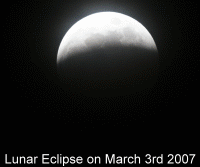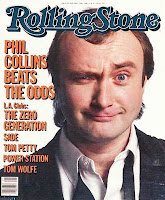Number 572 - Phil Collins

Number 572
Phil Collins
"Against All Odds"
(1984)
Phil Collins
"Against All Odds"
(1984)
.
.
Genre:Pop
I must admit, that was a pretty cool Lunar eclipse. Luckily enough for me the rain stopped long enough for me to sit outside and watch the eclipse till it was like this image above.
Then it rained.
Oh well, there is always 2011 to see it again.
I never saw Genesis when they came out to New Zealand in 1743 (that's how long it feels) but i heard it was a very entertaining concert at Western Springs. The song "Against All Odds" was a Number 1 hit worldwide and enters "The Definitive 1000" at Number 572. Now, if i could just get over this flu!
I never saw Genesis when they came out to New Zealand in 1743 (that's how long it feels) but i heard it was a very entertaining concert at Western Springs. The song "Against All Odds" was a Number 1 hit worldwide and enters "The Definitive 1000" at Number 572. Now, if i could just get over this flu!
Phil Collins' ascent to the status of one of the most successful pop and adult-contemporary singers of the '80s and beyond was probably as much of a surprise to him as it was to many others. Balding and diminutive, Collins was almost 30-years old when his first solo single, "In the Air Tonight," became a number two hit in his native U.K. (the song was a Top 20 hit in the U.S.). Between 1984 and 1990, Collins had a string of 13 straight U.S. Top Ten hits. Long before any of that happened, however, Collins was a child actor/singer who appeared as The Artful Dodger in the London production of +Oliver! in 1964. (He also has a cameo in A Hard Day's Night, among other films.) He got his first break in music at the end of his teens, when he was chosen to be a replacement drummer in the British art-rock band Genesis in 1970. (Collins maintained a separate jazz career with the band Brand X, as well.) Genesis was fronted by singer Peter Gabriel. They had achieved a moderate level of success in the U.K. and the U.S., with elaborate concept albums, before Gabriel abruptly left in 1974. Genesis auditioned 400 singers without success, then decided to let Collins have a go.
 The result was a gradual simplifying of Genesis' sound and an increasing focus on Collins' expressive, throaty voice. And Then There Were Three. . . went gold in 1978, and Duke was even more successful. Collins made his debut solo album Face Value in 1981, which turned out to be a bigger hit than any Genesis album. It concentrated on Collins' voice, often in stark, haunting contexts such as the piano-and-drum dirge "In the Air Tonight," which sounded like something from John Lennon's debut solo album, John Lennon/Plastic Ono Band. During the '80s, Collins balanced his continuing solo work with Genesis with enormous success. In 1992, Genesis released We Can't Dance and began an extensive tour. Upon its completion Collins released Both Sides in 1993, and the record became his first album not to produce a major hit single or go multi-platinum. In 1995, he announced that he was leaving Genesis permanently. The following year, he released Dance Into the Light. Although the album was a flop, its subsequent supporting tour was a success. The Hits collection followed in 1998, and a year later Collins made his first big-band record, Hot Night in Paris. ~ [William Ruhlmann, All Music Guide]
The result was a gradual simplifying of Genesis' sound and an increasing focus on Collins' expressive, throaty voice. And Then There Were Three. . . went gold in 1978, and Duke was even more successful. Collins made his debut solo album Face Value in 1981, which turned out to be a bigger hit than any Genesis album. It concentrated on Collins' voice, often in stark, haunting contexts such as the piano-and-drum dirge "In the Air Tonight," which sounded like something from John Lennon's debut solo album, John Lennon/Plastic Ono Band. During the '80s, Collins balanced his continuing solo work with Genesis with enormous success. In 1992, Genesis released We Can't Dance and began an extensive tour. Upon its completion Collins released Both Sides in 1993, and the record became his first album not to produce a major hit single or go multi-platinum. In 1995, he announced that he was leaving Genesis permanently. The following year, he released Dance Into the Light. Although the album was a flop, its subsequent supporting tour was a success. The Hits collection followed in 1998, and a year later Collins made his first big-band record, Hot Night in Paris. ~ [William Ruhlmann, All Music Guide]For Genesis see Number 684
 With the home-recorded Both Sides, Collins turns serious and socially conscious, a move that should have been commercial suicide but instead revealed hidden depths (as well as a tendency to preach). Perhaps in compensation, the worldbeat-flavored Dance Into the Light is almost willfully frivolous, sounding at times as if Collins were trying to channel Lionel Richie. A Hot Night in Paris goes for something completely different, as Collins drives a jazz big band through arrangements of Genesis oldies and his own tunes. A Buddy Rich album this isn't. Likewise, Tarzan isn't exactly a Phil Collins album, as his character-istically jaunty originals share space with Mark Man-cina's more conventionally Disney-fied film music. Still, it does include Collins' long-awaited duet with 'N Sync on "Trashin' the Camp." (J.D.CONSIDINE)
With the home-recorded Both Sides, Collins turns serious and socially conscious, a move that should have been commercial suicide but instead revealed hidden depths (as well as a tendency to preach). Perhaps in compensation, the worldbeat-flavored Dance Into the Light is almost willfully frivolous, sounding at times as if Collins were trying to channel Lionel Richie. A Hot Night in Paris goes for something completely different, as Collins drives a jazz big band through arrangements of Genesis oldies and his own tunes. A Buddy Rich album this isn't. Likewise, Tarzan isn't exactly a Phil Collins album, as his character-istically jaunty originals share space with Mark Man-cina's more conventionally Disney-fied film music. Still, it does include Collins' long-awaited duet with 'N Sync on "Trashin' the Camp." (J.D.CONSIDINE)
For John Lennon See Number 639
For a time, Phil Collins was nearly inescapable on the radio, and enormously popular with the listening public --something that made him an obvious target for critics. Despite his lumpen-pop appeal, however, Collins is an incisive songwriter and resourceful musician. Of all his albums, Face Value sounds most like his work with Genesis. "I Missed Again" and "If Leaving Me Is Easy" carry the same mournfulness of Duke, while "In the Air Tonight" condenses Wind and Wuthering's musical dramatics to a five-minute mini-epic. With Hello, I Must Be Going, Collins begins to find his own voice, flirting with soul (although soul didn't always flirt back, as his remake of "You Can't Hurry Love" demonstrates) and sharpening his skills at ballad-writing (which finally paid off in 1984, with "Take a Look at Me Now," from the Against All Odds film soundtrack). Collins pulled it all together with the aggressively likeable No Jacket Required, which had solid rockers, great ballads, and a pleasantly silly rewrite of Prince's "1999" ("Sussudio").
 With the home-recorded Both Sides, Collins turns serious and socially conscious, a move that should have been commercial suicide but instead revealed hidden depths (as well as a tendency to preach). Perhaps in compensation, the worldbeat-flavored Dance Into the Light is almost willfully frivolous, sounding at times as if Collins were trying to channel Lionel Richie. A Hot Night in Paris goes for something completely different, as Collins drives a jazz big band through arrangements of Genesis oldies and his own tunes. A Buddy Rich album this isn't. Likewise, Tarzan isn't exactly a Phil Collins album, as his character-istically jaunty originals share space with Mark Man-cina's more conventionally Disney-fied film music. Still, it does include Collins' long-awaited duet with 'N Sync on "Trashin' the Camp." (J.D.CONSIDINE)
With the home-recorded Both Sides, Collins turns serious and socially conscious, a move that should have been commercial suicide but instead revealed hidden depths (as well as a tendency to preach). Perhaps in compensation, the worldbeat-flavored Dance Into the Light is almost willfully frivolous, sounding at times as if Collins were trying to channel Lionel Richie. A Hot Night in Paris goes for something completely different, as Collins drives a jazz big band through arrangements of Genesis oldies and his own tunes. A Buddy Rich album this isn't. Likewise, Tarzan isn't exactly a Phil Collins album, as his character-istically jaunty originals share space with Mark Man-cina's more conventionally Disney-fied film music. Still, it does include Collins' long-awaited duet with 'N Sync on "Trashin' the Camp." (J.D.CONSIDINE)For Prince see Number 812
For Lionel Richie see Number 982
Rolling Stone Top 500 Songs ranked this song at Number (He is an Actor) and the Album ranked at Number (OK?)
This song has a crowbarred rating of 73 out of 108 pts
By The Year 1955 to 2005:
1955, 1956, 1957, 1958, 1959, 1960, 1961, 1962, 1963, 1964, 1965, 1966, 1967, 1968, 1969, 1970, 1971, 1972, 1973, 1974, 1975, 1976, 1977, 1978, 1979, 1980, 1981, 1982, 1983, 1984, 1985, 1986, 1987, 1988, 1989, 1990, 1991, 1992, 1993, 1994, 1995, 1996, 1997, 1998, 1999, 2000, 2001, 2002, 2003, 2004, 2005

underlay
Labels: Phil Collins 572



















0 Comments:
Post a Comment
<< Home